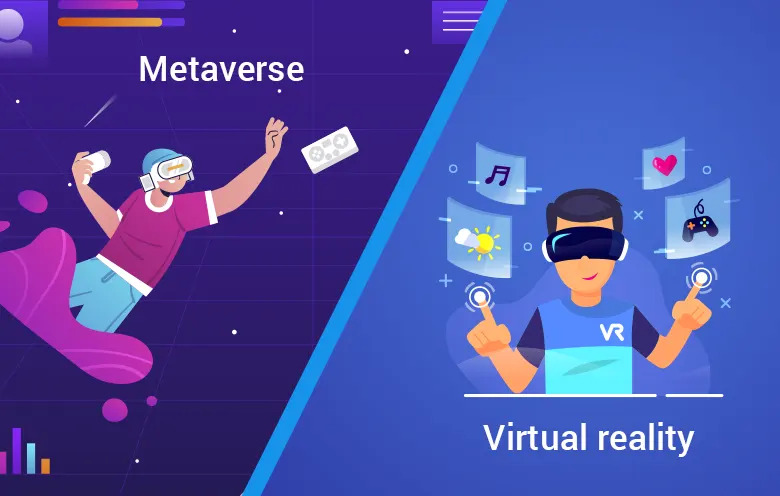Metaverse & Virtual Reality: A driving force for social skills or isolation
What is Virtual Reality:
Virtual Reality (VR) is a computer-generated environment with scenes and objects appear to be real, making the user feel they are physically present in their surroundings. This environment is created through a device known as a Virtual Reality headset or helmet. Through virtual reality a user can visualise himself as a character of the game, a doctor performing surgery, a sportsman learning new techniques. While speaking about the industry size of Virtual reality, the industry is growing at a fast pace, increasing from less than 12 billion U.S. dollars in 2022 to more than 22 billion U.S. dollars by 2025.
What is Metaverse:
Imagine a virtual world where billions of people live, work, shop, learn and interact with each other -all from the comfort of their couches in the physical world with the help of VR headset. That is the concept of Metaverse. The concept of metaverse is not new. The term metaverse was coined in 1992 by author Neal Stephenson in his sci-fi novel Snow Crash. The metaverse will be a virtual world that parallels our normal lives. Digital countries, neighbourhoods, building, parks and clubs will be present in metaverse. We can even buy and sell land, watch movies, play games, visit popular places and travel through metaverse. Hence, the metaverse is a meta version of our present world. I think it is a future where our physical and virtual realities blend so seamlessly that generations after us may not even be fully aware of any difference between them.
Global Metaverse Market 2018 - 2028
As we can clearly see the metaverse market going to rapidly increase from USD 100.27 Billion dollar in 2022 to USD 920.56 Billion dollar in 2028. Currently Metaverse has 300 million active users and forecasted to have 1.2 billion users till 2030.
Difference between Metaverse & Virtual Reality:
Virtual Reality is practically one of the foundation technologies for developing the metaverse. It allows users to access the metaverse. However, VR alone is only limited to certain functionalities.
On the other hand, the metaverse is a massive and gradually developing virtual universe, which would include a 3D representation of the internet. Just like surfing through different web pages, users can browse through virtual 3D spaces in the metaverse. In metaverse, not only we can see things, but with the help of advance VR headset and devices, we could even feel them. Most important of all, there is no limit to the possibilities of introducing innovation in the metaverse. There are many companies who are constructing environment like primitive earth, or earth after 200 years and many.
How Metaverse will enhance social skills:
As I mentioned, Metaverse will be having their own countries, neighbourhoods, building, parks and clubs. Many introverts face problem in attending social gathering or to meet new people. Those people, who before hesitated to go to clubs, social gathering can now easily attend them just by sitting at their home. If at any point of time, they find themselves uncomfortable, they can leave the event, without even answering to someone. Isn’t this a boom to an introvert.
- Providing a platform:
I believe that the metaverse platforms provide users with various unique opportunities to develop social skills and thereby enhance self-confidence in offline communication and relationship maintenance. The cognitive-social learning model of social-skill training insists that social skill training requires several processes involving knowing, modelling, role playing, and reinforcing. The services and activities in the recent metaverse platforms can facilitate the learning process as users can practice their social skills in a safe virtual environment by engaging in collective problem solving with other users and accumulating experiences of supporting one another. Moreover, an enhanced sense of social presence in the metaverse, would further facilitate supportive interactions among users and the co-learning of positive social skills.
- Encourage for public speaking:
With the increased accessibility of virtual reality (VR) and associated hardware (head-mounted displays or HMDs) and software (applications), specialists, secondary education and industry are all beginning to develop resources to address mental health issues in portions of the populations. More specifically, applications, such as Ovation, a public speaking application, have been developed to help reduce anxiety associated with 77% of the population and improve performance of people. Many demographics report believes that since it is easy to engage with avatars in metaverse social environments, introverts may gain confidence, and practice public speaking.
- Cure Autism:
Environment have been developed in metaverse for mental and behavioural health with cure to autism spectrum disorder (ASD). Examples such as “Floreo VR” have been developed to improve social, behavioural, communication, and life skills for individuals on the spectrum. These applications have been created to treat or modify specific characteristics and behaviours in these populations. Both autism spectrum disorder and introversion have been the subject of research and have been treated as conditions that need to be treated like other mental disorders. Furthermore, as studies have demonstrated, teachers prefer extroverts in the classroom as do employers in industry for many obvious reasons. The inspiration behind creating the applications above, such as Ovation and Floreo VR, is that these populations are considered in need of intervention and are provided with tools to ensure that they are engaged in socially prescribed activities along with the general population.
- Cure Mental health:
Metaverse is very effective in modifying memories and experiences—more than any other technology. It can be particularly effective for treating mental health issues when the anxiety is tethered to a specific memory or place, as in post-traumatic stress disorder. It can also prove effective in cases where person has loosed his self-confidence. Metaverse enhances the self-confidence of a person, which in turn enhances the social behaviour.
- Transforming situations:
Our daily interactions are changing and will continue to do so as the metaverse expands. A new digital body language will emerge to replace analogy, face-to-face social exchanges. Extroverts are now grappling with how to engage in the same way in the new virtual environment. More cases of depression and anxiety have been noted in the extrovert population during the pandemic. In essence, the introverts of today will become the extroverts of the virtual tomorrow. With the rise of the metaverse and democratization of virtual reality (VR) technology, especially, post-secondary education is poised to capitalize on the immersive learning environments social VR provides.
How Metaverse is responsible for isolation:
As per Mitch Prinstein (chief science officer, American psychological association), “Metaverse is creating more loneliness. This is creating far more body image concerns and exposure to dangerous content that’s related to suicidality”. The core idea of metaverse exist in virtual reality i.e., the interaction between you and the other person will be true, but in virtual world. You will be meeting each other, talking for hours but all in virtual experience. The idea of metaverse can lead a person to isolation from the physical world and makes him believe that life in virtual world is way better than physical world. The way we experience relationships now would be very different in the metaverse.
- Metaverse and relationship:
Social media was meant to connect us, and in many ways, it has, but it can also be argued that it has driven us to be more alone and distant than ever. Interactions via social networks are not as authentic or satisfying as real-world relationships. Social media users often believe they are connecting with friends or family via social networks, but really, they are at home and alone. Similarly, social video game experiences also leave the player isolated without real human engagement. This is important to recognize because loneliness can contribute to mental health issues as well as addiction. Social experiences in the Metaverse might feel more real via the use of the technology involved, but similarly to current digital experiences the individual within the Metaverse will still be alone. True human engagement and connection is an important aspect of our lives and our mental wellbeing that need to be maintained with or without a Metaverse.
- Potential of bullying, harassments:
Bad behaviour in the real world, on the internet and across social media has likewise occurred in existing metaverse-like experiences. Some women, for example, reported that their avatars were molested. Organizations will have to think about the potential for such problems and what safeguards and policies they'll need to establish to address those issues. Increase in activities like bullying and harassments leads to anxiety and other mental issues. Due to all this a person prefer to be in state of solitude.
- Limited participation:
Simulator sickness is a form of motion sickness that users can suffer due to long hours spent on metaverse. Such sickness decreases the dopamine level in body which results into lack of interest. Those people who are suffering from simulator sickness could not engage in social activities for long hours and thus they will be socially left out.
Also, individuals with auditory or visual disabilities may also have difficulties in the metaverse. They cannot visualise and feel anything in metaverse. When everyone else is using metaverse for their normal life, these especially abled people will be isolated from others.
- The Metaverse and Mental Health:
Virtual experience can bring escape and relief from the stresses of life and invoke temporary pleasure, but excessive use of VR is associated with many mental health issues including depression, irritability, stress, paranoid ideation, somatic symptoms, and psychoses, among others. In short, the excessive use of metaverse or VR can lead to mental issues. Based on a report from the World Health Organization, depression will be the single biggest cause of ill health in the world by 2030.
Percentage of people suffering from several mental issues.
As we can clearly see around 7% of the youth is suffering from anxiety, 6% from depression and around 20% from any kind of disorder. Increase in the use of virtual reality can even contribute in rise of this number.
​There are both, positive and negative aspects of Metaverse and virtual reality. Metaverse provides us relaxation, platform to learn complex things, etc. While pointing out its negative, metaverse increases anxiety, and other mental issues. If we use the concept of virtual reality with precautions, it will help human race grown in different dimension. Not only we will experience revolution in social technology but also in medical technology through virtual reality.
In my view the metaverse should be treated as an alternative to social gatherings and not as a primary way of gathering. The metaverse should be made a part of life and not the life itself. Although there are negative aspects of metaverse gathering, but a person who is handicapped can attend social gathering without any difficulties. A person can travel whole world, watch movies, play games, attend marriage, and many more, just by sitting on his desk. Isn’t this magical?
At the end, I would like to say, “The development of metaverse by human is just like clay in the hands of potter, they can either turn it into a social skill enhancing environment or a way of isolation for people”.


